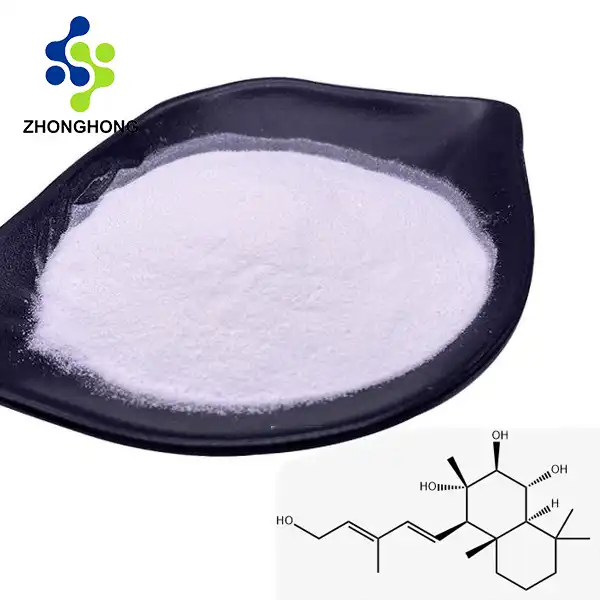The Link Between Gastrodin and Enhanced Cognitive Function
Understanding Gastrodin's Neuroprotective Properties
Gastrodin exhibits remarkable neuroprotective properties that contribute to its potential in enhancing cognitive function. Research has shown that this compound can cross the blood-brain barrier, allowing it to directly interact with neural tissues. Once in the brain, gastrodin acts as a powerful antioxidant, neutralizing harmful free radicals that can damage neurons and impair cognitive processes. Additionally, it has been observed to modulate neurotransmitter levels, particularly gamma-aminobutyric acid (GABA), which plays a crucial role in regulating neuronal excitability and maintaining cognitive balance.
Gastrodin's Impact on Memory and Learning
One of the most intriguing aspects of gastrodin's cognitive benefits is its potential to enhance memory and learning. Studies have demonstrated that gastrodin can improve spatial memory and learning abilities in animal models of cognitive impairment. This effect is thought to be mediated through the compound's ability to promote neuroplasticity, the brain's capacity to form new neural connections and adapt to new information. By enhancing synaptic plasticity and promoting the growth of new neurons in the hippocampus, a region critical for memory formation, gastrodin may help improve both short-term and long-term memory processes.
Gastrodin's Role in Stress Reduction and Cognitive Performance
Chronic stress is a well-known detriment to cognitive function, and gastrodin appears to offer protective effects against stress-induced cognitive decline. Research has shown that gastrodin can modulate the hypothalamic-pituitary-adrenal (HPA) axis, the body's primary stress response system. By regulating cortisol levels and reducing oxidative stress in the brain, gastrodin may help mitigate the negative impact of chronic stress on cognitive performance. This stress-reducing effect could potentially lead to improved focus, attention, and overall mental clarity.
Gastrodin in Modern Medicine: What Research Shows
Clinical Studies on Gastrodin's Cognitive Benefits
While much of the research on gastrodin's cognitive benefits has been conducted in preclinical settings, a growing body of clinical evidence is emerging. Several small-scale human studies have investigated the effects of gastrodin supplementation on various aspects of cognitive function. For instance, a randomized, double-blind, placebo-controlled trial involving elderly individuals with mild cognitive impairment found that those who received gastrodin showed significant improvements in memory and executive function compared to the placebo group. These findings, while preliminary, suggest that gastrodin may hold promise as a potential therapeutic agent for age-related cognitive decline.
Gastrodin's Potential in Neurodegenerative Diseases
The neuroprotective properties of gastrodin have sparked interest in its potential application for neurodegenerative diseases such as Alzheimer's and Parkinson's. Preclinical studies have demonstrated that gastrodin can reduce the accumulation of beta-amyloid plaques, a hallmark of Alzheimer's disease, and protect dopaminergic neurons, which are primarily affected in Parkinson's disease. While these results are encouraging, it's important to note that further research, particularly in human subjects, is needed to fully elucidate gastrodin's efficacy in treating or preventing these complex neurological disorders.
Mechanisms of Action: How Gastrodin Affects the Brain
The cognitive benefits of gastrodin are attributed to its multifaceted mechanisms of action in the brain. In addition to its antioxidant and neurotransmitter-modulating effects, gastrodin has been shown to influence several key pathways involved in neuronal health and function. For example, it can activate brain-derived neurotrophic factor (BDNF) signaling, which is crucial for neuronal growth and survival. Gastrodin also appears to have anti-inflammatory properties in the central nervous system, potentially reducing neuroinflammation associated with cognitive decline. Furthermore, research suggests that gastrodin may enhance cerebral blood flow, ensuring optimal nutrient and oxygen delivery to brain tissues.
Natural Supplements vs. Pharmaceuticals: Gastrodin's Edge
Safety Profile and Side Effects
One of the most significant advantages of gastrodin as a natural supplement is its favorable safety profile. Traditional use of Gastrodia elata in Chinese medicine spans centuries, and modern research has corroborated its low toxicity and minimal side effects. In contrast, many pharmaceutical cognitive enhancers can carry a risk of adverse effects, ranging from mild to severe. While more extensive long-term studies are needed, the current evidence suggests that gastrodin may offer a gentler alternative for those seeking cognitive support without the potential drawbacks associated with some synthetic drugs.
Holistic Approach to Cognitive Health
Unlike many pharmaceutical interventions that target specific pathways or symptoms, gastrodin's multifaceted action in the brain aligns with a more holistic approach to cognitive health. Its ability to simultaneously address multiple aspects of brain function - from neuroprotection and neurotransmitter balance to stress reduction and improved blood flow - makes it a promising candidate for comprehensive cognitive support. This broad-spectrum effect may be particularly beneficial for addressing the complex, multifactorial nature of cognitive decline and neurodegenerative diseases.
Potential for Synergistic Effects with Other Natural Compounds
Another intriguing aspect of gastrodin as a natural supplement is its potential for synergistic effects when combined with other cognitive-enhancing compounds. Researchers have begun exploring how gastrodin might interact with other neuroprotective agents, such as Ginkgo biloba extracts or omega-3 fatty acids, to provide enhanced cognitive benefits. This combinatorial approach, which is more feasible with natural compounds than with pharmaceuticals due to safety considerations, could open up new avenues for personalized cognitive health strategies.
Conclusion
Gastrodin emerges as a promising natural compound with significant potential in the realm of cognitive health. Its multifaceted mechanisms of action, favorable safety profile, and holistic approach to brain function make it an intriguing alternative to traditional pharmaceuticals. While more research is needed to fully understand its effects and optimal use, the current evidence suggests that gastrodin could play a valuable role in supporting cognitive function and protecting against age-related cognitive decline. If you want to get more information about this product, you can contact us at liaodaohai@gmail.com.
_1728976869676.webp)








